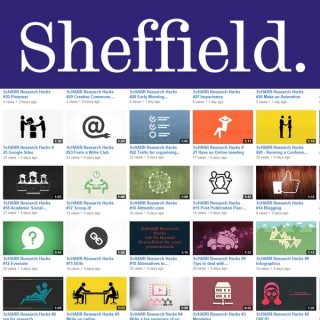
ScHARR Research Hacks
Follow ScHARR Research HacksShort videos to help academics work smarter and maximise their impact and reach
- Aug 27, 2015 LATEST EPISODE
- infrequent NEW EPISODES
- 1m AVG DURATION
- 43 EPISODES
More podcasts from The University of Sheffield
Latest episodes from ScHARR Research Hacks

Explains Google Forms for researchers

Explains post publication peer review and how it can help scholarly communication

Four alternatives to PowerPoint for your academic presentations

What Digital Object Identifiers are and why you should use them as part of your research profile

How Evernote can be used in the academic setting

Why making a video about your research can help share it to a wider audience

Explains the benefits for academic blogging

Why making a podcast can help others find out about your research whilst on the move.

How you can manage multiple tasks and projects with other people using Trello

How IFTTT can be used to automate Web and social media processes as part of your scholarly communication

How setting up an Orcid unique id can help tell you apart from other researchers on the Web.

Explains the alternative metric bookmarklet available from Altmetric.com

Explains curation using the Scoop.it! tool

Academic alternatives to social networks such as Facebook

How using tools like Lanyrd and Eventbrite can help you run your academic conference, workshop or seminar

How online meeting tools such as Google Hangouts and Skype can be used to give presentations, teach and have meetings.

Why starting your own Write Club writing retreat can help you and fellow researchers complete writing tasks you might have been putting off.

Why setting up a website may not be as much work as you think it is using Google Sites

How Adobe Voice can help share your research with a wider audience

How you can use Pinterest to curate and collate useful posters, tables and infographics to share with colleagues, students and peers.

How you can use a tool like News.me to stay on top of your busy Twitter timeline

How setting up a Mendeley account can help you discover other's research and help promote your own

How Impactstory can help you measure your scholarly output and improve your academic CV

3 ScHARR Research Hacks to set you on your way to a more product day's research

Explains Creative Commons and how you can use it to search for images to use as part of your presentations and posters.

How meditation can be helped to reduce stress and improve research outputs

How walking meetings can be the better alternative to sitting around a table.

Explains the file hosting and altmetric site Figshare

How using a personal homepage like Netvibes can help you stay up to date with your latest research interests and share them with the world.

How to collate some of your online presences in one place using About.me

A convenient alternative to storing your content on your computer or USB drive

Discusses the idea of presenting online rather than face to face.

How you can use Tweetdeck to manage your Twitter account much better

How Slideshare can be used to share your presentations, publications and posters.

How writing a lay summary of your research can help a wider audience understand and share it across networks and media

How using a tool like Google Docs can help you write a paper in real time with collaborators across the globe

How using rss and an rss reader such as Feedly can help you stay in touch with your favorite websites, journals and blogs

How you can use Twitter as part of your scholarly communications as well as employing it as a search engine and database of knowledge.

How infographics can be used to express data and research results in a simple and effective way

Four tips to help academics deal with the deluge of information they have to deal with on a daily basis

Explains about writing for the popular research news site The Conversation

Why you should consider completing your Google Scholar profile

















